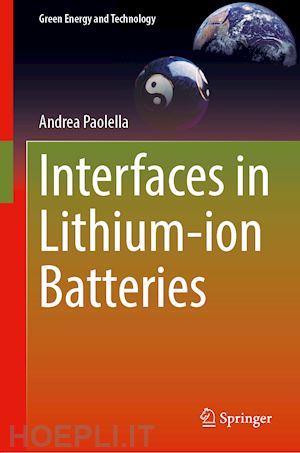
Questo prodotto usufruisce delle SPEDIZIONI GRATIS
selezionando l'opzione Corriere Veloce in fase di ordine.
Pagabile anche con Carta della cultura giovani e del merito, 18App Bonus Cultura e Carta del Docente
This book explores the critical role of interfaces in lithium-ion batteries, focusing on the challenges and solutions for enhancing battery performance and safety. It sheds light on the formation and impact of interfaces between electrolytes and electrodes, revealing how side reactions can diminish battery capacity. The book examines the nanochemistry of these reactions, emphasizing their profound influence on overall battery properties. It highlights the urgent need for battery material scientists to develop new additives and chemistries to address these interface-related issues, which have significant industrial implications.
After providing a fundamental understanding of Li-ion batteries, the book analyzes the evolution of the solid electrolyte interface (SEI) by considering various negative electrode materials such as graphite, silicon, lithium metal, and anode-less configurations. It also explores the chemistries of cathode materials, including their decomposition and methods to mitigate unwanted oxidation.
Furthermore, the book discusses the growing interest in solid-state batteries as a future technology, focusing on the reactivity of polymeric and ceramic solid electrolytes with anodes and cathodes, which presents additional challenges at the interface level. Finally, it addresses the specific challenges associated with emerging chemistries like Li-S and Li-air batteries, providing insights into polysulfide formation and LiOH conversion.
Introduction to Lithium ion batteries.- Electrolyte: the
operational window.- Interface at the negative electrode: the Solid Electrolyte
Interface-SEI.- Interface at the positive electrolyte: the Cathode Electrolyte
Interface-CEI.- Lithium Metal and beyond: when lithium metal dies.- Interfaces
in polymer electrolytes.- Interfaces in ceramic electrolytes.- Lithium-Sulfur
batteries: interfacial reactions.- Li-air batteries.- Characterization methods
to analyze interfaces.- Conclusions and Perspectives.
Prof. Andrea Paolella is a certified PhD electrochemist and material scientist He specializes in the synthesis and electrochemical characterization of various nano- and micron-sized ceramic materials, such as oxide solid electrolytes (e.g, garnet LLZO, and NASICON LAGP) and positive electrodes (LiFePO4 or high voltage NMC). He is currently Associate Professor of Inorganic Chemistry at University of Modena and Reggio Emilia (Modena, Italy) has a PhD from Italian Institute of Technology (Genova, Italy), and a master's degree and a bachelor's degree from Universitá degli Studi di Bologna (Bologna, Italy).











Il sito utilizza cookie ed altri strumenti di tracciamento che raccolgono informazioni dal dispositivo dell’utente. Oltre ai cookie tecnici ed analitici aggregati, strettamente necessari per il funzionamento di questo sito web, previo consenso dell’utente possono essere installati cookie di profilazione e marketing e cookie dei social media. Cliccando su “Accetto tutti i cookie” saranno attivate tutte le categorie di cookie. Per accettare solo deterninate categorie di cookie, cliccare invece su “Impostazioni cookie”. Chiudendo il banner o continuando a navigare saranno installati solo cookie tecnici. Per maggiori dettagli, consultare la Cookie Policy.